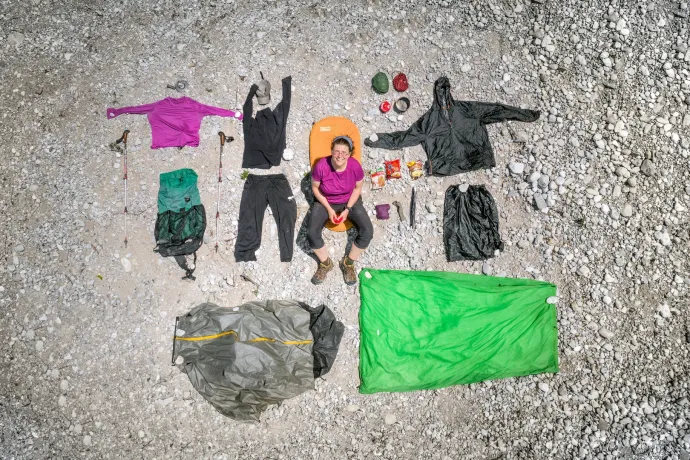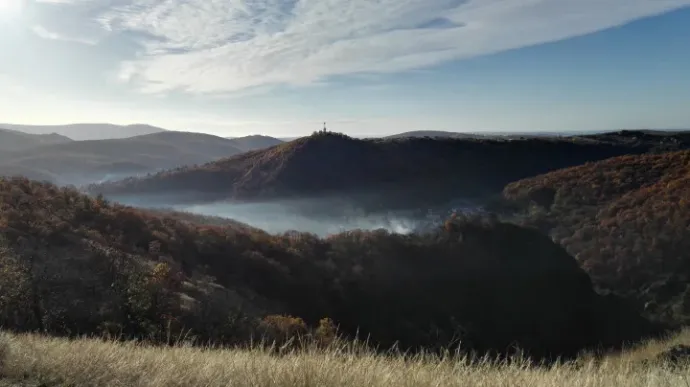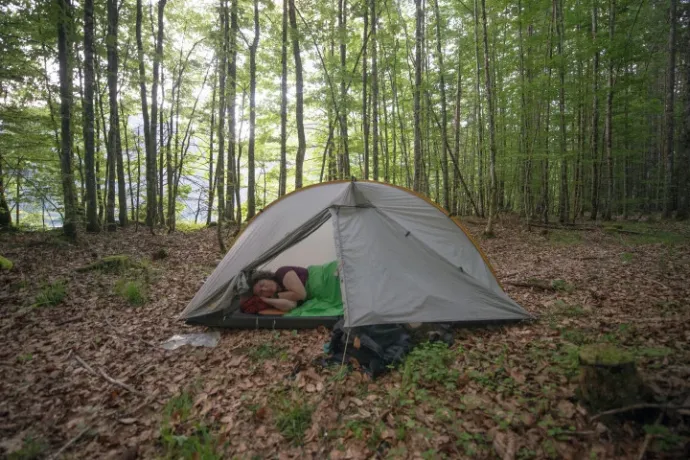
Christine Thürmer is probably the woman who has walked the most kilometres around the world. The former manager has spent most of the last few years sleeping in tents, washing in cold streams and making rain pants out of bin bags. We asked her about her favourite European hiking trail, the National Blue Trail in Hungary but then a lot of other things came up as well.
Christine Thürmer, 54, is a thru-hiker, a long-distance hiker or ultra-long-distance trekker – who knows what you call a trekker who hikes extreme distances of at least 500-1000 kilometres at a time? In 2004, her lucrative job as a manager in Germany was terminated, and soon afterwards she was hiking the 4,277-kilometre Pacific Crest Trail from Mexico to Canada. In 2007, she said goodbye to the classic business world for good, and with short breaks, mostly in Berlin, she continues to walk, cycle and paddle.
She has never been particularly sporty, has a slight fear of heights, and is not motivated in the least to be a record-breaker (the ‘woman who walks the most' epithet on her website does not come from her but from the administrator who helps work on her books), she simply enjoys what she does. Her website is in German, but she has a blog where she posts in English, as she does on her Instagram – but only "when she has something to say".
The National Blue Trail is a real paradise for beginners
"I'm a total Hungary fan, I've completely fallen in love with the country," Christine Thürmer begins to talk about her memories of the Blue Tour. When she embarked on the National Blue Trail in 2016, she had already completed some of the world's longest and most exciting long-distance hiking trails.
She stumbled upon the Blue Trail by chance, and her eyes lit up when she saw it. "Everybody goes hiking in the Alps and Scandinavia, which is boring, and I'm a sucker for hiking trails that people barely know," she explains.
When she first started telling people she knew about her plans, she was greeted with a general lack of understanding. The counterarguments were always the same: the Hungarian landscape is boring, flat, and apart from thermal baths, what can you do there?
"Germans don't really have fresh impressions of Hungary. From the GDR days, most Germans remember Lake Balaton, maybe goulash soup, folk music and that's about it. Add to that the fact that since Viktor Orbán has been in charge, Hungary's image in the eyes of Germans is far from the best. So everyone tried to talk me out of the blue tour."
– Christine tells us from Switzerland, where she is taking part in a lecture series. "Of course, for me, this made me want to go even more. After completing the first stage, I could see that I was right. The Blue Trail is a paradise for beginners."
Christine Thürmer has so far written three books about her hikes, all of which have been Spiegel bestsellers in Germany and received excellent reader reviews. In her latest book, Weite Wege wandern (Hiking Long Distances), she praises the Blue Trail as the best European hiking route for beginners. "If anyone comes to me for advice, I usually send them all on the Blue Trail and sing its praises with enthusiasm, even though I am not secretly sponsored by the Hungarian Tourist Agency."

She likes it mainly because it's calm, predictable and offers a lot of fun, plus:
- the route infrastructure is excellent, the signage along the entire route is excellent, it is simply impossible to get lost, "I hardly know of any other hiking trail in Europe that is so stress-free";
- it is also beginner-friendly because "the Blue Route has a high tolerance for mistakes";
- it passes through beautiful forests, many of them beech, and they are dreamlike, especially in autumn;
- wild camping is legal in Hungary ("All the Germans run to Scandinavia because wild camping is free there, and when I tell them 'look, it's the same in Hungary', nobody believes me");
- there are no weather extremes or they are very, very rare;
- Hungary is one of the best value for money countries in the EU;
- accommodation is good, food is good and cheap, which is a real luxury for a hiker;
- "castle ruins, churches and thermal baths, and the thermal lake of Hévíz, of course" – she lists her favourite sights visited during the tour;
- most of the people are friendly;
- Finally, "Germans usually have a kind of arrogant image of Eastern Europe, thinking that everything there is so run-down, whereas I found that most Hungarian villages are very nice, clean and tidy."
The only difficulty for her was when she was walking through villages mostly inhabited by Roma, but fortunately, thanks to thekektura.click.hu website and its author Béla Horváth, she was aware of the phenomenon and understood what surrounded her.
She says that in Germany, however, it is difficult to talk about these villages without being immediately labelled, whereas she only mentions them in her reports to tell prospective hikers that there is no reason to be afraid.
Two years later, in 2018, she also walked the Blue Trail of the Great Plain. It was because she was on her way from Germany to Bulgaria, to the Black Sea, on the E3 European long-distance hiking trail. "I couldn't have done a more stupid thing than to walk across the Great Plain in July," she muses cheerfully. "You're constantly walking past fields, with constant detours for irrigation and little shade."
"You always see the cool pictures of the American deserts where you can only walk with a parasol: well, you don't have to go there, you can just walk the Blue Trail of the Great Plains in summer."
– she says. Anyway, she'd definitely like to return at some point to hike the Rockenbauer Blue in South Transdanubia.
Hiking and money
Christine Thürmer is always asked how she manages to hike so much in so many years, from North America to New Zealand to South Korea. She always answers the same: "I worked very hard before and now I live off what I put aside from my manager's salary at the time. I don't accept any sponsorship, I only use my own money. Sometimes people accuse me of being very hedonistic. But why? As long as I'm not hurting anybody, not getting on anybody's nerves, and I can finance it myself, I'll do it. I walk primarily because it gives me pleasure and I don't need to find ideologies for it," is her creed.
She says that if someone wants to walk, and has the means to do it, but doesn't, they usually don't have the intrinsic motivation, and then they often create a cover story, such as walking to raise money or to fight the climate crisis.
"But why do we have to pour a moral sauce on everything? If you don't have enough intrinsic motivation, then if it rains for ten days, if all your over-achieving goals become completely forgotten, you're quite likely to give up. I think it's enough for people to fulfill their dreams and not have to apologize to anybody."
At most, such hikers can only annoy themselves, as opposed to backpackers travelling without money, whom she doesn't particularly like. "They are usually young, educated people from the Western societies of the world. Born in good countries at good times, they would have every opportunity to earn money for their passports, but instead, they travel to third world countries, abuse the hospitality of the people there and have other people support them. Poor countries thus become a backdrop for the entertainment of the Western youth while the people living there struggle to survive," she says.

Christine Thürmer does not normally travel to third world countries, but she often visits places where people live in poverty. And they also like to feed travellers. How does she reconcile her principles if, say, someone in a small, poor village wants to invite her to their home? "I rarely say yes to that, only if, say, I see that my host has a garden, can feed themselves, so they’re not poor in the true sense of the word.
And the big difference with the above-mentioned hikers is that I can accept such invitations when they arise, but I am not dependent on them. For example, I'm happy to have lunch with the person who invited me, but I have to find somewhere else to stay for the night."
Her accommodation is mostly in her tent, but if possible, she likes to make a trip to a town or larger city about once a week, where she stocks up on a modest food supply, goes online, eats a hot meal and gets a room. And when she does, she's fantastically happy to take a shower.
For more quick, accurate, impartial news and interesting stories from and about Hungary, subscribe to the Telex English newsletter!
The translation of this article was made possible by our cooperation with the Heinrich Böll Foundation.